Blog del Instituto Cervantes de Dublín
Torre Martello
Puntos suspensivos / Films that give you chills… Mientras duermes
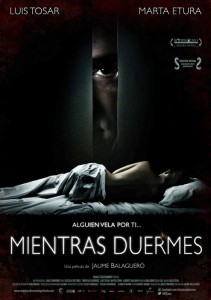 Esta tarde, día 6 a las 6, seguro que no te quedarás dormido con la película que te hemos preparado, el último éxito de Jaume Balagueró, director, entre otras películas, de Los sin nombre o REC.
Esta tarde, día 6 a las 6, seguro que no te quedarás dormido con la película que te hemos preparado, el último éxito de Jaume Balagueró, director, entre otras películas, de Los sin nombre o REC.
Mientras duermes, producida en 2010 y estrenada en España en 2011, ganó en su día 6 premios Gaudí y está protagonizada por Marta Etura y Luis Tosar. Es una de esas películas que no se terminan cuando se apaga el proyector, sino que siguen dando vueltas en la cabeza del espectador hasta mucho tiempo después.
Ten cuidado, alguien vela por ti. Si quieres saber quién es, te lo contamos en nuestro Café Literario. Es gratis, pero peligroso.
This afternoon, 6th at 6, you will not fall asleep with the movie that we have prepared for you. The last thriller of Jaume Balagueró, director, among other films, of The Nameless or REC.
Sleep Tight, starring Marta Etura and Luis Tosar, was produced in 2010 and released in Spain in 2011. This film, winner of 6 Gaudí Awards, is one of those movies that do not end when the screen turns off. It sticks to your mind and disturbs you until much later.
Be careful, someone is looking after you. If you want to know who it is, just come to our Café Literario. It’s free, and still dangerous.
Concierto de Salvador Andrades en el Cervantes de Dublín / Salvador Andrades in concert
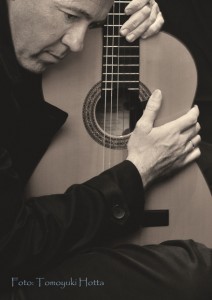 Salvador Andrades, guitarrista gaditano, alumno de Antonio Sánchez, padre de Paco de Lucía, ofrecerá un concierto en nuestro Café Literario el próximo día 18 de noviembre.
Salvador Andrades, guitarrista gaditano, alumno de Antonio Sánchez, padre de Paco de Lucía, ofrecerá un concierto en nuestro Café Literario el próximo día 18 de noviembre.
Salvador ha trabajado junto a artistas como Camarón de la Isla, Fosforito o Tomatito y ha participado como músico en varias películas, entre ellas The mask of Zorro bajo la dirección musical de James Horner.
En este concierto, Salvador Andrades interpretará sus propias composiciones, impregnadas de músicas como el jazz y la bossa nova. ¡Ya puedes comprar tu entrada en reservas.dublin@cervantes.es! Solo cuesta 10 euros.
Salvador Andrades, guitarist from Cadiz, will offer a unique concert in our Café Literario on the 18th November.
Salvador studied guitar with Antonio Sánchez, Paco de Lucia’s father. He has worked with artists such as Camarón de la Isla, Tomatito and Fosforito. As a musician, he has participated in several movies, including The Mask of Zorro, under the musical direction of James Horner.
In this concert, Salvador Andrades will play his own compositions, steeped in music like jazz and bossa nova. Now, you can buy your ticket at reservas.dublin@cervantes.es. It’s only 10 euros!
18/11 a las 7.30pm, Café Literario
Entradas: €10,
reservas.dublin@cervantes.es
Audiolibro de la semana / Audiobook of the week: El asesinato de Johann Sebastian Bach
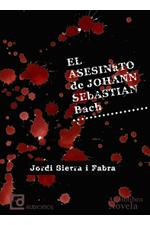 Hablamos de muertos, de asesinatos, de historias de terror, ya que celebramos hoy el Día de los Muertos, y sobre este asunto, para prolongar durante este fin de semana las emociones que nos trajo Halloween, os proponemos esta semana, El asesinato de Johann Sebastian Bach, una historia de misterio del multipremiado autor catalán Jordi Sierra i Fabra en la que, tal como se anuncia en nuestra plataforma de descarga de audilibros «el glamour puede transformarse en terror».
Hablamos de muertos, de asesinatos, de historias de terror, ya que celebramos hoy el Día de los Muertos, y sobre este asunto, para prolongar durante este fin de semana las emociones que nos trajo Halloween, os proponemos esta semana, El asesinato de Johann Sebastian Bach, una historia de misterio del multipremiado autor catalán Jordi Sierra i Fabra en la que, tal como se anuncia en nuestra plataforma de descarga de audilibros «el glamour puede transformarse en terror».
En El asesinato de Johann Sebastian Bach, Daniel Ros, su protagonista, descubre en un piso frente al suyo el cuerpo destripado de su vecina. Pocos minutos después, Daniel conoce a Julia, una chica muy atractiva que dice ser prima de la víctima. Daniel decide entonces comenzar su propia investigación y descubre, poco a poco, que detrás del oficio de modelo de su vecina Laura, esta escondía una vida mucho menos fascinante y más terrible de lo que podía imaginar.
Ya sabes, para descargar este audiolibro y comenzar a disfrutar de él solo necesitas tener a mano tu carné de biblioteca y tu contraseña. ¡Que tengas un fin de semana terroríficamente feliz!
We speak of the dead, we talk about murders and horror stories as we celebrate the Day of the Dead and, on this issue, to extend to this weekend the emotions of Halloween, we suggest a story full of mystery as our audiobook of the week.
In El asesinato de Johann Sebastian Bach, written by the multi awarded catalan writer Jordi Sierra i Fabra, Daniel Ros, a young journalist, discovers the disemboweled body of his neighbor, who seems to have been the victim of a sadist. A few minutes later, Daniel meets Julia, an attractive girl who claims to be the victim’s cousin. Then Daniel decides to start his own research and discover, little by little, that behind his neighbor’s job as a model, she hid a life much less fascinating and much more terrible.
To download this audiobook and start enjoying it, you just need your library card and your password. Have a terrific and mysterious weekend!
Audiobook of the week / Audiolibro de la semana: Citas en Manhattan
 Llega el viernes y con él, como cada semana, el audiolibro que te recomienda la biblioteca, uno más entre los muchos que están disponibles en nuestra página electrónica.
Llega el viernes y con él, como cada semana, el audiolibro que te recomienda la biblioteca, uno más entre los muchos que están disponibles en nuestra página electrónica.
Esta vez le toca el turno a Citas en Manhattan de Emma Reverter.
Victoria Sachs es una periodista especializada en política internacional que vive en Nueva York. Con la llegada del calor desciende el número de noticias, por lo que recibe el encargo de escribir una columna ligera para el suplemento veraniego.
Al no ser su especialidad, tiene miedo de fracasar. La protagonista investigará, contratará a un asesor de citas y compartirá con los lectores las novedosas posibilidades que ofrece el mercado para encontrar a nuestra media naranja.
Una novela que aúna el rigor de la investigación periodística con la chispa del feminismo. Los datos, cifras y páginas web, que se mencionan en el libro son reales.
La descarga de este audiolibro solo requiere que tengas a mano tu carnet de la biblioteca y tu contraseña.
This week, as every Friday, we bring you an audiobook. This time, the title we selected is Citas en Manhattan, by Emma Reverter.
Victoria Sachs is a journalist specialized in international politics living in New York. During summer, the number of news about politics decreases, so she receives the assignment of writing a light column for the summer supplement of her newspaper about online dating.
Not being her specialty, she is afraid to fail, so she decides to hire a dating advisor and share with her readers the results of her investigations and the different possibilities offered by online services to find our special someone.
This novel combines the rigour of investigative journalism with feminism. Data, numbers and web pages mentioned in the book are real so… what are you waiting for? The downloading of this audiobook only requires you to get ready your library card and your password.
Premios Príncipe de Asturias 2013 / Prince of Asturias Awards 2013
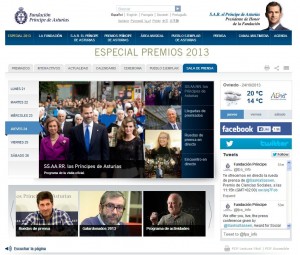 Esta semana es la semana de los Premios Príncipe de Asturias. El pasado martes, los premiados este año 2013 comenzaron a llegar a Oviedo para participar en diversas conferencias, charlas o clubs de lectura organizados con motivo de la ceremonia de entrega de los premios que se celebrará mañana viernes, a las 18:30 de la tarde, hora española.
Esta semana es la semana de los Premios Príncipe de Asturias. El pasado martes, los premiados este año 2013 comenzaron a llegar a Oviedo para participar en diversas conferencias, charlas o clubs de lectura organizados con motivo de la ceremonia de entrega de los premios que se celebrará mañana viernes, a las 18:30 de la tarde, hora española.
Los galardonados este año son Michael Haneke, Premio Príncipe de Asturias de las Artes, Saskia Sassen, Premio Príncipe de Asturias de Ciencias Sociales, Annie Leibovitz, Premio Príncipe de Asturias de Comunicación y Humanidades, la Organización Nacional de Ciegos Españoles (ONCE), Premio Príncipe de Asturias de la Concordia, Sociedad Max Planck para el Avance de la Ciencia, Premio Príncipe de Asturias de Cooperación Internacional, José María Olazábal, Premio Príncipe de Asturias de los Deportes, Peter Higgs, François Englert y el CERN, Premio Príncipe de Asturias de Investigación Científica y Técnica, y Antonio Muñoz Molina, que fuera director del Instituto Cervantes de Nueva York, premio Príncipe de Asturias de las Letras. Toda la información acerca de sus trayectorias vitales y profesionales está disponible en la página de la Fundación Príncipe de Asturias.
Las ruedas de prensa previas, los encuentros con los premiados, y la propia ceremonia de entrega de premios, presidida, cómo no, por el Príncipe de Asturias, se pueden seguir igualmente, en directo, a través de la página de la fundación.
This is the week of the Prince of Asturias Awards. On Tuesday , the laureates in 2013 arrived in Oviedo to participate in various meetings, lectures or reading clubs organized on the occasion of the award ceremony to be held tomorrow, Friday , at 6:30pm Spanish time .
This year’s laureates are Michael Haneke, Prince of Asturias Award for the Arts, Saskia Sassen, Prince of Asturias Award for Social Sciences, Annie Leibovitz, Prince of Asturias Award for Communication and Humanities, the Spanish Organization for the Blind (ONCE ), Prince of Asturias Award for Concord, Max Planck Society for the Advancement of Science, Prince of Asturias Award for International Cooperation, José María Olazábal, Prince of Asturias Award for Sports, Peter Higgs, François Englert and CERN, Prince of Asturias Award for Technical and Scientific Research , and Antonio Muñoz Molina, former director of the Instituto Cervantes in New York , Prince of Asturias award for Literature. All the information about them is available on the website of the Prince of Asturias Foundation.
On the website of the Prince of Asturias Foundation you can follow all the press conferences and meetings with the laureates, as well as the awards ceremony, presided by the Prince of Asturias.
Clausura del VI Congreso Internacional de la Lengua Española / Closing session of the 6th International Congress of the Spanish Language

De izda. a dcha., Víctor García de la Concha, director del Instituto Cervantes; Julio Martínez Mesanza, director Académico, y Francisco Moreno, director ejecutivo del centro de la institución en la Universidad de Harvard.
Hoy se clausura el VI Congreso Internacional de la Lengua Española. En el día de ayer, el director del del Instituto Cervantes, Víctor García de la Concha, presentó en Ciudad de Panamá los principales proyectos e iniciativas de la institución que representa. Entre estos proyectos, destaca la iberoamericanización del Instituto Cervantes, que supone una mayor implicación de los países hispanohablantes en la actividad del Instituto Cervantes para la difusión de la lengua común y de la cultura en español.
En este sentido, el Instituto Cervantes ha firmado un convenio con el Gobierno de México para la cesión recíproca de sus centros culturales en terceros países. El Instituto está especialmente interesado en la colaboración mutua en Estados Unidos, donde México cuenta con 14 centros de cultura.
Asímismo, se ha firmado un acuerdo de colaboración con la UNAM, que inaugurará el próximo 25 de noviembre el Centro de Estudios Mexicanos en la sede del Instituto Cervantes en Madrid, y hay conversaciones ya muy avanzadas para firmar convenios similares con Colombia, Chile y Perú.
Todos los vídeos relacionados con el VI Congreso están disponibles en la página del departamento de prensa del Instituto Cervantes.
The 6th International Congress of the Spanish Language closes today in Panama. Yesterday, the director of the Instituto Cervantes, Victor Garcia de la Concha, presented in Panama City the projects and initiatives of the institution he represents. Among these projects, highlights the iberoamericanization of the Instituto Cervantes, which means a deeper involvement of the Spanish speaking countries in the activities of the Instituto Cervantes, in order to promote and spread the Spanish language nd Spanish and Hispanic-American culture.
In this sense, the Instituto Cervantes has signed an agreement with the Government of Mexico for the reciprocal transfer of cultural centers in third countries. The Institute is especially interested in mutual collaboration in the United States, where Mexico has 14 cultural centers.
Instituto Cervantes has also signed a collaboration agreement with UNAM. As a result of this agreement, UNAM will open next month, November 25th, the Center for Mexican Studies at the Instituto Cervantes in Madrid. There are advanced talks to sign similar agreements with Colombia, Chile and Peru.
All videos related to the VI Congress, and more information about the congress are available at the Instituto Cervantes website.
¡Prepárate para Halloween! / Get ready for Halloween!
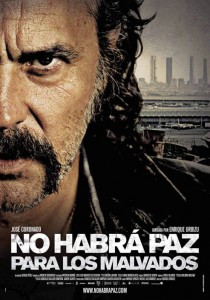 Apenas unos días antes de la llegada de Halloween, con sus sobresaltos y sus escalofríos, comienza el nuevo ciclo de cine en el Instituto Cervantes de Dublín, un ciclo que nos trae cinco de las últimas creaciones españolas de cine de terror y suspense.
Apenas unos días antes de la llegada de Halloween, con sus sobresaltos y sus escalofríos, comienza el nuevo ciclo de cine en el Instituto Cervantes de Dublín, un ciclo que nos trae cinco de las últimas creaciones españolas de cine de terror y suspense.
Mañana miércoles os presentamos No habrá paz para los malvados, película que recibió 6 premios Goya en 2011. En ella, su director, Enrique Urbizu, narra la historia de Santos Trinidad, un inspector de policía que un domingo cualquiera, de camino a casa, ya muy borracho, se ve involucrado en un triple asesinato.
La película comienza a las seis de la tarde. Venga, ¡prepárate para Halloween!
To get you in the mood for Halloween, Instituto Cervantes Dublin brings you 5 of the latest Spanish films in the thriller and horror genres, as part of a nail-biting new film season.
Tomorrow, Wednesday 23rd, we start this film series with No rest for the wicked, a film by Enrique Urbizu that won 6 Goya Awards in 2011.
Following the trail of a missing girl, Police Inspector Santos Trinidad gets involved in a shooting. The result: three dead bodies and a witness who manages to escape. Santos will get into hot water explaining the mess if he does not find the witness. The hunt begins… and our film screening starts at 6pm. Come on! Get ready for Halloween!
Preparando el Festival Isla 2014 / Preparing Isla Festival 2014
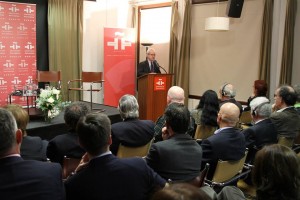 Durante este fin de semana, hemos celebrado la segunda edición del Festival Isla de Literatura. Por segundo año consecutivo, Irlanda, Latinoamérica y España se encontraron en el Instituto Cervantes de Dublín para hablar de la literatura y sus alrededores.
Durante este fin de semana, hemos celebrado la segunda edición del Festival Isla de Literatura. Por segundo año consecutivo, Irlanda, Latinoamérica y España se encontraron en el Instituto Cervantes de Dublín para hablar de la literatura y sus alrededores.
Una vez más, queremos agradecer desde aquí el apoyo y la colaboración de instituciones como Dublin UNESCO City of Literature, Ireland Literature Exchange, el Instituto Vasco Etxepare, Poetry Ireland, y cómo no, a la inestimable aportación de Dublin City University, National University of Ireland in Galway, National University of Ireland in Maynooth. Trinity College Dublin, y University College Cork. Muchísimas gracias a todos ellos.
Como dijera Rosa León, directora del Instituto Cervantes de Dublín durante su discurso de inauguración, «tenía que ser aquí, en esta isla esmeralda, donde naciera y creciera nuestro festival, donde la semilla de nuestro esfuerzo diera sus frutos. En esta misma tierra donde tantos genios de la literatura cavaron antes con su pluma para fecundarla y enriquecerla, para hacerla abierta, acogedora y libre.
Porque la gran riqueza de Irlanda es su cultura y su maravillosa tradición literaria, y esa poderosa fuerza se da la mano aquí, en este festival, con la fuerza del español, con quinientos millones de seres humanos en cuatro continentes, con la segunda lengua de comunicación a nivel internacional».
Rosa León recordó también las hermosas palabras del presidente Michael D. Higgins durante su discurso en 2012 y, como no, tuvo de palabras de cariño y reconocimiento hacia Seamus Heaney, cuya presencia estaba prevista en el festival desde antes del verano. Sus poemas, los mismos que él había elegido para su lectura durante el Festival Isla, se hicieron presentes en la sala gracias a la voz del actor irlandés Tom Hickey.
Finalmente, Rosa León cedió la palabra a otro gran amigo de Seamus y del propio Instituto Cervantes, el gran escritor irlandés John Banville, que «de forma amabilísima y desinteresadamente atendió la llamada del Instituto Cervantes para cubrir la ausencia de Seamus Heaney».
John Banville, en su intervención, recordó la impresión que le había causado, en su primera visita a España, un hombre a caballo en la isla de Mallorca. También recordó su visita a América del Sur para visitar la casa de la madre de Thomas Mann y nos hizo reflexionar, de este modo, sobre la universalidad de la literatura. Muchísimas gracias, John, por tu generosidad.
Esperamos que todos hayais disfrutado del Festival y esperamos también recibir vuestras sugerencias y aportaciones, para mejorar en lo que sea posible en la edición del Festival Isla de 2014 que hoy mismo comenzamos a preparar.
Las fotos del festival están ya disponibles en nuestra página de Facebook.
Los vídeos del Festival estarán muy pronto disponibles en nuestro canal de Youtube.
During last weekend , we celebrated the 2nd Isla Literary Festival . For the second year in a row , Ireland , Latin America and Spain joined at the Instituto Cervantes in Dublin to talk about literature and its surroundings.
Once again , we thank the support and collaboration of institutions such as Dublin UNESCO City of Literature, Ireland Literature Exchange , Instituto Vasco Etxepare, Poetry Ireland, and of course, the invaluable contribution of Dublin City University, National University of Ireland in Galway, National University of Ireland in Maynooth, Trinity College Dublin, and University College Cork. Many thanks to all of them.
As Rosa Leon, director of Instituto Cervantes in Dublin, said during her speech , “our Festival had to be born in here , in the Emeral Isle. On this same land where many geniuses of literature dug with their pens to fertilize and to enrich it , to make it an open land, free and welcoming.
Because the rich of Ireland is its culture and its wonderful literary tradition, and that powerful force joins hands here, in this festival, with the strength of the Spanish language, with half a billion of human beings on four continents , with the second language of international communication.”
Rosa Leon recalled as well the beautiful words of President Michael D. Higgins during his speech in 2012 and she had words of love and gratitude to Seamus Heaney, whose presence was expected at the Festival since before summer . His poems , the same poems he had chosen for reading during the Isla Festival, were present in the official opening thanks to the voice of the Irish actor Tom Hickey.
Finally , Rosa León gave the floor to another great friend of Seamus and Instituto Cervantes , the great Irish writer John Banville , who “so lovable and unselfishly answered our call to cover the absence of Seamus Heaney.”
John Banville recalled the impression that a man riding a horse in Mallorca made on him during his first visit to Spain. He also mentioned his trip to South America, to visit the house of Thomas Mann‘s mother and, in this way, he made us reflect on the universality of literature. Thank you , John , for your generosity .
We hope you all have enjoyed the Festival as much as we did, and we look forward to receiving your suggestions and contributions to improve, as best as we can, the 3rd edition of our Isla Festival that we start preparing today.
The photos of the Isla Festival 2013 are now available on our Facebook page .
The videos of the interviews we prepare will soon be available on our YouTube channel.
Audiolibro de la semana / Audiobook of the week: Vidas perpendiculares
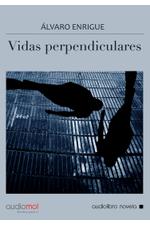
En Vidas perpendiculares, el autor Álvaro Enrigue nos cuenta la historia de Jerónimo Rodríguez, cuyos rasgos físicos son iguales a los de un típico chico mexicano. Sin embargo, al mismo tiempo, Jerónimo tiene la habilidad de sentir los miedos de su padre cuando está cerca de él, y puede recordar cuáles eran sus sentimientos cuando vivía con una tribu prehistórica o cuando vivía en el siglo XVII en Italia. El autor escribe todas estas vidas pasadas y la presente con un nexo de unión entre todas, la búsqueda del amor.
Si lo prefieres, la versión impresa de este libro también está a tu disposición en nuestra biblioteca.
Álvaro Enrigue participa mañana sábado en nuestro Festival Isla de Literatura, mañana sábado, a las 4.30 de la tarde.
In Vidas Perpendiculares Álvaro Enrique tells us about the life of Jerónimo Rodríguez Loera. He looks apparently like a typical mexican boy, but he is able to feel his father’s fears when he is close to him, and to remember all his past lives.
If you prefer reading than listening, there is a printed version of this book available in our library.
Álvaro Enrigue participates in our Isla Literary Festival, tomorrow at 4.30pm.
Te apuntas al Coro Cervantes? Would you like to join the Cervantes Choir?
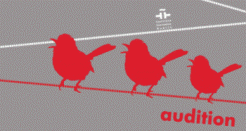 ¿ Te gusta cantar?, ¿conocer gente?, ¿practicar tu español a través de la música? Si tu respuesta es sí a alguna de esas preguntas, el Coro del Instituto Cervantes de Dublín puiede ser tu solución.
¿ Te gusta cantar?, ¿conocer gente?, ¿practicar tu español a través de la música? Si tu respuesta es sí a alguna de esas preguntas, el Coro del Instituto Cervantes de Dublín puiede ser tu solución.
Para formar parte del coro, no necesitas saber solfeo y tampoco es necesario pagar ningún tipo de inscripción. Lo único que necesitas es buen oído y buena disposición.
Para más información sobre su funcionamiento y sobre su director, Borja Zanón, escribenos a reservas.dublin@cervantes.es.
Do you like singing?, meeting people?, would you like to practice your Spanish through music? If your answer is yes to any of these questions, the Cervantes Choir may be a good chance for you.
To join the choir, you do not need to know music theory or to pay any fee. All you need is a good ear and good disposition.
For more information about how Cervantes Choir works and about its director, Borja Zanon, please write to reservas.dublin@cervantes.es.
No solo de mesas vive el Festival Isla de Literatura / It’s not just about round table discussions
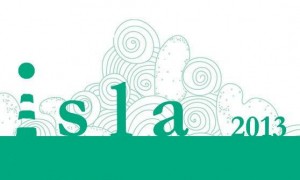 No, en el Festival Isla no solo hay mesas redondas.
No, en el Festival Isla no solo hay mesas redondas.
A lo largo de las últimas semanas hemos estado desgranando en estas páginas los detalles de las mesas redondas que conforman el Festival Isla de Literatura. Pero nuestro festival es mucho más que eso, porque además tendrás la oportunidad de asistir a lecturas en inglés y en español de textos de poesía y narrativa, leídos por sus propios autores, tendrás la posibilidad de comprar sus libros, y tendrás la ocasión de tomarte un café y un tentempié en nuestra sala de exposiciones. Allí mismo podrás encontrarte con los autores que participan en el evento y pedirles que firmen tu ejemplar.
Disfruta de la literatura, en todos los sentidos, en compañía de René Vázquez, Daniel Freidemberg, Tomás Mac Síomóin, Paula Meehan, Kirmen Uribe, Enrique Vila-Matas, John Banville, Eileen Battersby, John Boyne, Julio Espinosa, Álvaro Enrigue, María Tena, Fernando Sánchez Dragó, Marina Carr, Susana Cella y Manuel Gutiérrez Aragón. Estás avisado. ¡Allá tú si te lo pierdes!
No. Isla Festival of Literature is not just about round table discussions.
Over the last few weeks, we have been showing in these pages the details of the round table discussions that will be held during our Festival Isla of Literature. But our festival is much more than that, because you will also have the opportunity to join our readings of poetry and fiction, with texts read by the authors themselves. You will have the occasion to buy their books, and to take a coffee and a snack in our exhibition room. Right there, you can meet the authors participating in the event and ask them to sign your copy.
Enjoy the best literature in the company of René Vázquez, Daniel Freidemberg, Tomás Mac Síomóin, Paula Meehan, Kirmen Uribe, Enrique Vila-Matas, John Banville, Eileen Battersby, John Boyne, Julio Espinosa, Álvaro Enrigue, María Tena, Fernando Sánchez Dragó, Marina Carr, Susana Cella and Manuel Gutiérrez Aragón. You are warned! Don’t miss it!
VI Congreso Internacional de la Lengua Española / 6th International Congress of the Spanish Language
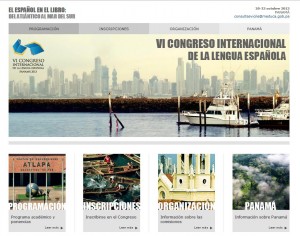 El próximo domingo 20 de octubre da comienzo el VI Congreso Internacional de la Lengua Española que se celebrará en Ciudad de Panamá hasta el miércoles día 23. Este congreso, organizado por el Gobierno de Panamá, la Real Academia Española, con la Asociación de Academias de la Lengua Española, y el Instituto Cervantes, tiene como objetivo promover la reflexión y el análisis sobre el pasado, el presente y el futuro del libro escrito y publicado en lengua española.
El próximo domingo 20 de octubre da comienzo el VI Congreso Internacional de la Lengua Española que se celebrará en Ciudad de Panamá hasta el miércoles día 23. Este congreso, organizado por el Gobierno de Panamá, la Real Academia Española, con la Asociación de Academias de la Lengua Española, y el Instituto Cervantes, tiene como objetivo promover la reflexión y el análisis sobre el pasado, el presente y el futuro del libro escrito y publicado en lengua española.
Tal y como se puede leer en su página electrónica, «este congreso continúa la tarea de los congresos de Zacatecas (1997), Valladolid (2001), Rosario (2004), Cartagena de Indias (2007) y Valparaíso (2010), y forma parte del programa de conmemoraciones del Quinto Centenario del Descubrimiento del Océano Pacífico».
En Panamá se encontrarán más de 200 expertos y creadores, entre ellos Mario Vargas Llosa, Sergio Ramírez, William Ospina, Antonio Skármeta, Laura Restrepo, Héctor Abad Faciolince, Juan Villoro, Alonso Cueto, Abel Posse y Rosa María Britton, y los debates girarán en torno al lema «El español en el libro: del Atlántico al Mar del Sur».
Toda la información relacionada con esta sexta edición, su intenso programa, así como información acerca del congreso virtual que se celebrará de forma paralela y complementaria al congreso presencial, se puede encontrar en las diferentes secciones de su página oficial. Merece la pena visitarla, del mismo modo que merece la pena visitar el nuevo portal de la Real Academia Española, que será presentado dentro del propio congreso. Un portal con contenidos totalmente renovados y con una mayor oferta de recursos para los hispanohablantes de todo el mundo.
El Instituto Cervantes, por su parte, presentará algunos de sus proyectos e iniciativas más recientes, como las relacionadas con la formación de profesores y con su presencia en los Estados Unidos.
Next Sunday, October 20th, starts the 6th International Congress of the Spanish Language to be held in Panama City until Wednesday 23rd. This conference , organized by the Government of Panama , the Real Academia Española, with the Asociación de Academias de la Lengua Española, and the Instituto Cervantes, aims to promote reflection and analysis on the past, present and future of the book written and published in Spanish .
As you can read on its website, “this conference continues the work of the congresses of Zacatecas (1997 ), Valladolid (2001 ) , Rosario (2004 ), Cartagena de Indias (2007 ) and Valparaiso (2010 ), and is part of the commemorations of the fifth anniversary of the discovery of the Pacific Ocean . “
In Panama, more than 200 experts and creators will meet , including Mario Vargas Llosa , Sergio Ramírez , William Ospina , Antonio Skármeta , Laura Restrepo , Hector Abad Faciolince , Juan Villoro , Alonso Cueto , Abel Posse and Rosa Maria Britton , and discussions will focus on the theme “The Spanish in the book : from the Atlantic Ocean to the South sea .”
All information related to this sixth edition, its intense program , and information about the virtual conference to be held in parallel and complementary to presential Congress, can be found in the different sections of its official website . Well worth a visit , just as worth visiting the new website of the Real Academia Española, which will be presented within the Congress, with a fully renovated content and a greater supply of resources for Spanish speakers worldwide.
The Cervantes Institute , meanwhile, will present some of its most recent projects and initiatives , including those related to teachers training and its presence in the United States.
También hablamos de género en el Festival Isla 2013 / A Question of Genres: Isla Literary Festival 2013
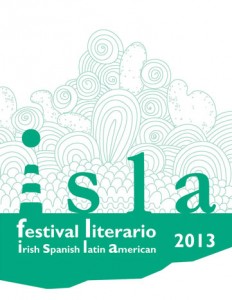 Entramos en la recta final. Llegamos a la semana en la que comienza, este mismo viernes, el Festival Isla de Literatura 2013.
Entramos en la recta final. Llegamos a la semana en la que comienza, este mismo viernes, el Festival Isla de Literatura 2013.
Precisamente en la recta final del festival, en la última mesa redonda que se celebrará el domingo día 20, contaremos con la presencia de Marina Carr, Susana Cella y Manuel Gutiérrez Aragón. Con ellos, Jean Philippe Imbert, profesor de DCU y experto en la materia, hablaremos de géneros. No solo de géneros literarios. También de género sexual. Géneros que tienden a mezclarse, a fundirse, a buscarse y, a menudo, a pelearse entre ellos.
¿Hay un género que domine sobre los demás, que ejerza su poder opresor sobre los otros?, ¿existe un género rey (o reina), o son todos igualmente necesarios? Estas y otras preguntas, y también algunas de sus respuestas, el domingo día 20, a partir de las once de la mañana.
We are now entering the stretch, very close to the beginning of the Isla Literary Festival, this Friday,18th October, 4:00pm.
Precisely, at the end of the Festival, in the last round table discussion to be held on Sunday 2oth, we will receive Marina Carr, Susana Cella and Manuel Gutiérrez Aragón. With them, Jean Philippe Imbert, DCU professor, we will talk about genres.
Genres that tend to overlap, get together, blur lines but, more often, clash with each other. Is there a single genre that dominates the rest and exerts its oppressive power over others? Is there a genre King (or Queen) or are they all equally important? These and other interesting questions, (and maybe some of the answers, who knows!) next Sunday, starting at eleven o’clock in the morning.
Audiolibro de la semana: Los ojos del tuareg / Audiobook of the week
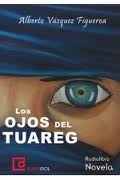
Esta semana te traemos el audiolibro Los ojos del tuareg de Alberto Váquez Figueroa, una novela que es la continuación de su gran éxito literario Tuareg.
Esta obra, inspirada en hechos reales, narra en primera persona el dramatismo de los conflictos provocados por uno de los grandes acontecimientos deportivos y publicitarios del mundo occidental, el famoso rally París-Dakar. Frente al espectáculo televisivo que nosotros conocemos, existe otra cara muy distinta: la destrucción del medio ambiente y la falta de respeto por la vida de los nativos del desierto de África.
La novela nace con una intención de denuncia, y abunda en diálogos en torno al cinismo de una sociedad occidental corrompida por el dinero.
Para descargar este audiolibro solo necesitas tu carnet de biblioteca y pulsar aquí.
This week, we bring you the audiobook Los ojos del tuareg by Alberto Vázquez Figueroa, the second part of his literary success Tuareg.
This novel, inspired by true events and narrated in first person, relates the drama of the conflicts caused by one of the biggest sports events in the world: the París–Dakar rally.
Despite the television show we all know, there is another very different side of this event: the destruction of the environment and the lack of respect for the lifes of the natives of the African desert.
In that sense, Los ojos del tuareg is a report plenty of dialogues about the cynicism of our Western society corrupted by money.
Downloading this audiobook only requires your library card and your password. Los ojos del tuareg is just one click away from you.
Foreign travelers in Spain through the ages / Viajeros extranjeros en España a través de los siglos
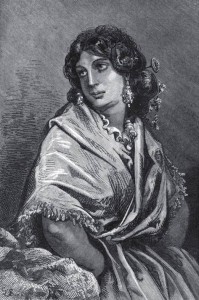 When the Spaniard is in love, she is terribly sincere… “I’m no Gazmoña” said a Spanish lady to me once(…)
When the Spaniard is in love, she is terribly sincere… “I’m no Gazmoña” said a Spanish lady to me once(…)
You mistake if you conceive that the Spanish lady differs much in exterior manner from other ladies in the more highly civilised parts of Europe(…) But there is an intensity, a sincerity, and an artlessness of character here that you do not meet elsewere. (Terence Hughes. Revelations of Spain in 1845, Vol. I, 400)
Centro Virtual Cervantes presents today the digital exhibition La imagen de España en los Viajeros extranjeros, which reflects the ways in which Spain has been represented over the last two centuries, using as a basis the important collection of books of the Instituto Cervantes Library in London.
In this exhibition you will find authors from the UK, USA, Ireland, Canada and Australia, who wrote their works between 1750 and 1950. A superb collection. A magnificent exhibition. Don’t miss it!
Cuando una española está enamorada, es profundamente sincera (…) «No soy gazmoña» me dijo una dama española una vez (…)
Se equivocaría uno si imaginara que la española difiere mucho en los modales de otras mujeres de las más civilizadas regiones de Europa… Pero hay aquí una intensidad, una sinceridad y una candidez que no se hallan en otras partes (Terence Hughes. Revelations of Spain in 1845, Vol. I, 400)
Hoy se presenta en el Centro Virtual Cervantes la exposición digital La imagen de España en los viajeros extranjeros, que recoge los modos en que se ha representado España desde el mundo anglohablante a lo largo de los últimos dos siglos, utilizando como base la importante colección de libros de viaje de la biblioteca del Instituto Cervantes de Londres.
Se trata de autores procedentes del Reino Unido, Estados Unidos, Irlanda, Canadá y Australia, que escribieron sus obras entre 1750 y 1950. Una magnífica colección. Una magnífica exposición. ¡No te la pierdas!



